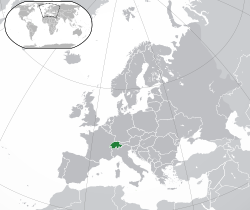Swiss Confederation Schweizerische Eidgenossenschaft (de) Confédération suisse (fr) Confederazione Svizzera (it) Confederaziun svizra (rm) Confoederatio Helvetica (CH) (la) | |
|---|---|
މޮޓޯ: (unofficial) "Unus pro omnibus, omnes pro uno" (Latin) އިނގިރޭސިބަހުން: One for all, all for one German: Einer für alle, alle für einen French: Un pour tous, tous pour un Italian: Uno per tutti, tutti per uno Romansh: In per tuts, tuts per in | |
ގައުމީ ސަލާމް: "Swiss Psalm" | |
| ވެރިރަށް | Bern[note 1] |
| Largest city | Zürich |
| ރަސްމީ ބަސްތައް | German, French, Italian, Romansh[1] |
| ޑިމޮނިމް | Swiss |
| ސަރުކާރު | Federal state, with parliamentary system and direct democracy |
• Federal Council | Moritz Leuenberger (VP 10) Micheline Calmy-Rey Hans-Rudolf Merz Doris Leuthard (Pres. 10) Eveline Widmer-Schlumpf Ueli Maurer Didier Burkhalter |
• Federal Chancellor | Corina Casanova |
| ޤާނޫނު ހަދާ މަޖިލިސް | Federal Assembly |
• މަތީ ގެ | Council of States |
• ތިރި ގެ | National Council |
• Foundation date | 1 August[note 2] 1291 |
• de facto | 22 September 1499 |
• Recognized | 24 October 1648 |
• Restored | 7 August 1815 |
• Federal state | 12 September 1848[2] |
ސަރަޙައްދު | |
• Total | 41,284 km2 (15,940 sq mi) (136th) |
• Water (%) | 4.2 |
އާބާދީ | |
• 2009 estimate | 7,771,600[3] (94th) |
• 2007 census | 7,593,500 |
• Density | 188/km2 (486.9/sq mi) (65th) |
| ޖީޑީޕީ (ޕީޕީޕީ) | 2008 estimate |
• ޖުމްލަ | $315.768 billion[4] (38th) |
• ބޮލަކަށް ޖެހެނީ | $43,195[4] (7th) |
| ޖީޑީޕީ (nominal) | 2008 estimate |
• ޖުމްލަ | $500.260 billion[4] (21st) |
• ބޮލަކަށް ޖެހެނީ | $68,433[4] (4th) |
| ޖިނީ (2000) | 33.7 medium |
| އެޗްޑީއައި (2007) | Error: Invalid HDI value (9th) |
| ފައިސާ | Swiss franc (CHF) |
| ޓައިމް ޒޯން | ޔޫޓީސީ+1 (CET) |
• ސަމާ (ޑީއެސްޓީ) | ޔޫޓީސީ+2 (CEST) |
| ޑްރައިވިންގ ސައިޑް | right |
| ކޯލް ކޯޑް | +41 |
| އައިއެސްއޯ 3166 ކޯޑް | CH |
| އިންޓަރނެޓް ޓީއެލްޑީ | .ch |
- De jure "federal city"; de facto capital. Because of historical federalist sensibilities, Swiss law does not designate a formal capital, and some federal institutions such as courts are located in other cities.
- Traditional. The Federal Charter only mentions "early August" and the treaty is a renewal of an older one, now lost.
- Federal Constitution, article 4, "National languages" : National languages are German, French, Italian and Romansh; Federal Constitution, article 70, "Languages", paragraph 1: The official languages of the Confederation are German, French and Italian. Romansh shall be an official language for communicating with persons of Romansh language.
- A solemn declaration of the Tagsatzung declared the Federal Constitution adopted on 12 September 1848. A resolution of the Tagsatzung of 14 September 1848 specified that the powers of the institutions provided for by the 1815 Federal Treaty would expire at the time of the constitution of the Federal Council, which took place on 16 November 1848.
- "Population size and population composition". Swiss Federal Statistical Office. Swiss Federal Statistical Office, Neuchâtel. 2009. Retrieved 2009-08-27.
- "Switzerland". International Monetary Fund. Retrieved 1 October 2009.
- Human Development Report 2009. The United Nations. Retrieved 5 October 2009.
Wikiwand in your browser!
Seamless Wikipedia browsing. On steroids.
Every time you click a link to Wikipedia, Wiktionary or Wikiquote in your browser's search results, it will show the modern Wikiwand interface.
Wikiwand extension is a five stars, simple, with minimum permission required to keep your browsing private, safe and transparent.



